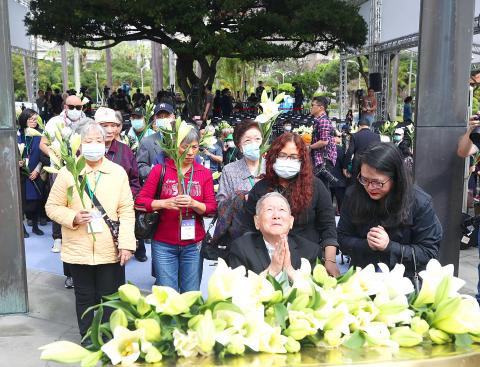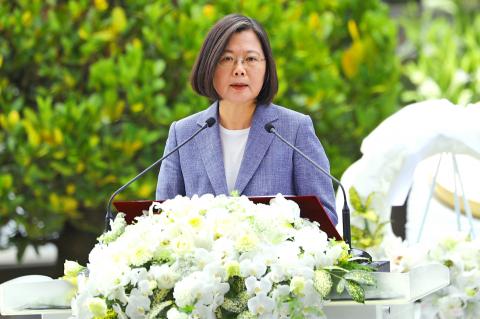President Tsai Ing-wen (蔡英文) yesterday said that she has instructed the National Security Bureau (NSB) to declassify files requested by the Transitional Justice Commission within one month, with the exception of the few that cannot be published due to legal restrictions.
Tsai made the remark in a speech at a ceremony in Taipei commemorating the 228 Incident, a crackdown launched by the then-Chinese Nationalist Party (KMT) regime against civilian demonstrators following an incident in Taipei on Feb. 27, 1947.
Regarding the files the commission has requested — such as those relating to the deaths of political activist Lin I-hsiung’s (林義雄) family members and Carnegie Mellon University assistant professor of statistics Chen Wen-chen (陳文成) — the bureau must “maximize transparency and minimize restrictions” for public use, she said.

Photo: CNA
The government’s efforts to promote human rights education would continue, Tsai said, adding that the Control Yuan’s soon-to-be-established national human rights commission should endeavor to ensure that the concept of human rights takes root in Taiwan.
The bureau later said that it is in the process of removing about 500 pages of files that include intelligence sources, agent names and intelligence shared by foreign governments, which comprise only 0.0038 percent of all documents and would be stored separately.
The remaining files that are not classified would be transferred to the National Archives Administration by the end of next month, it added.

Photo: CNA
In addition to Tsai, politicians including Premier Su Tseng-chang (蘇貞昌) and Taipei Mayor Ko Wen-je (柯文哲) joined survivors of the 228 Massacre and their families at the ceremony at 228 Peace Memorial Park (228和平紀念公園).
Tsai laid a wreath at the monument to the victims and awarded certificates that “restored the reputation” of the victims and their families, overturning the designations given to them at the time as “rioters,” “rebels” or “communist sympathizers.”
“We believe that by remembering history and reflecting on the past, we can make our society more united, more democratic and more consolidated, and move Taiwan forward,” Tsai said.
Due to concerns about the spread of COVID-19, this year’s commemoration was scaled down, as many victims and their descendants live abroad — in places such as Japan and South Korea, which are facing outbreaks of the coronavirus — and were unable to attend.
An Executive Yuan 228 Incident report issued in 1992 said that 18,000 to 28,000 people, many of them members of Taiwan’s intellectual elite, were killed during the subsequent government crackdown, which lasted until May 1947.
The 228 Incident marked the beginning of the White Terror era, during which political dissidents were suppressed, imprisoned or executed, with the nation remaining under martial law until 1987.
Additional reporting by Huang Hsin-po

A Ministry of Foreign Affairs official yesterday said that a delegation that visited China for an APEC meeting did not receive any kind of treatment that downgraded Taiwan’s sovereignty. Department of International Organizations Director-General Jonathan Sun (孫儉元) said that he and a group of ministry officials visited Shenzhen, China, to attend the APEC Informal Senior Officials’ Meeting last month. The trip went “smoothly and safely” for all Taiwanese delegates, as the Chinese side arranged the trip in accordance with long-standing practices, Sun said at the ministry’s weekly briefing. The Taiwanese group did not encounter any political suppression, he said. Sun made the remarks when

The Taiwanese passport ranked 33rd in a global listing of passports by convenience this month, rising three places from last month’s ranking, but matching its position in January last year. The Henley Passport Index, an international ranking of passports by the number of designations its holder can travel to without a visa, showed that the Taiwan passport enables holders to travel to 139 countries and territories without a visa. Singapore’s passport was ranked the most powerful with visa-free access to 192 destinations out of 227, according to the index published on Tuesday by UK-based migration investment consultancy firm Henley and Partners. Japan’s and

BROAD AGREEMENT: The two are nearing a trade deal to reduce Taiwan’s tariff to 15% and a commitment for TSMC to build five more fabs, a ‘New York Times’ report said Taiwan and the US have reached a broad consensus on a trade deal, the Executive Yuan’s Office of Trade Negotiations said yesterday, after a report said that Washington is set to reduce Taiwan’s tariff rate to 15 percent. The New York Times on Monday reported that the two nations are nearing a trade deal to reduce Taiwan’s tariff rate to 15 percent and commit Taiwan Semiconductor Manufacturing Co (TSMC, 台積電) to building at least five more facilities in the US. “The agreement, which has been under negotiation for months, is being legally scrubbed and could be announced this month,” the paper said,

MIXED SOURCING: While Taiwan is expanding domestic production, it also sources munitions overseas, as some, like M855 rounds, are cheaper than locally made ones Taiwan and the US plan to jointly produce 155mm artillery shells, as the munition is in high demand due to the Ukraine-Russia war and should be useful in Taiwan’s self-defense, Armaments Bureau Director-General Lieutenant General Lin Wen-hsiang (林文祥) told lawmakers in Taipei yesterday. Lin was responding to questions about Taiwan’s partnership with allies in producing munitions at a meeting of the legislature’s Foreign Affairs and National Defense Committee. Given the intense demand for 155mm artillery shells in Ukraine’s defense against the Russian invasion, and in light of Taiwan’s own defensive needs, Taipei and Washington plan to jointly produce 155mm shells, said Lin,